Always an original, she was an enthusiastic baseball fan for many years and, later, became an avid watcher of soap operas on television. According to most of the sources, she was bisexual. She married only once, in 1937, with actor John Emery, whom she divorced in 1941, and never had any children. She was known to be a chain smoker, a heavy drinker and a drug user. She had exhibitionist tendencies such as parading around in the nude at parties or in her dressing room. She also allegedly didn’t like wearing underwear. She never learned to set herself limits and she created an instantly recognisable larger-than-life persona which, as years go by, went on to outshine her acting skills. Walt Disney animator Marc Davis admitted that she had been one of his models for the Cruella de Vil character in The 101 Dalmatians.
Needless to say that such a woman became a gay icon. Let’s discover more about this amazing lady.

British postcard in the Cameo Series, London, no. KC27.
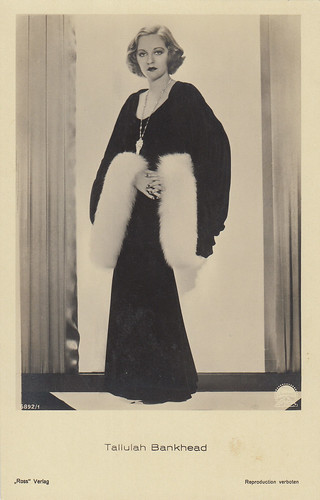
German postcard by Ross Verlag, no. 6892/1, 1931-1932. Photo: Paramount.
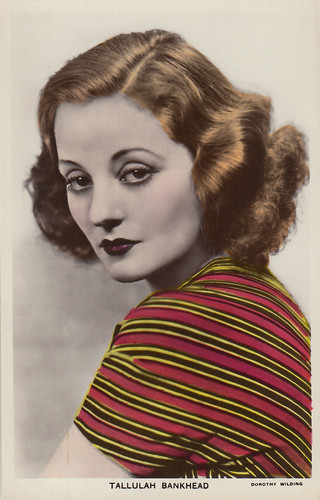
British postcard in the Colourgraph series, London, no. C208. Photo: Dorothy Wilding.
The beginnings
Tallulah Bankhead was born on the 31st of January 1902 in Huntsville, Alabama, U.S.A. She was not the first Tallulah in the Bankhead family, as she was named for her paternal grandmother, whose parents believed they have conceived her during a stopover at Tallulah Falls in Georgia.
Her paternal grandfather was a noted politician and was notably a Senator from Alabama from 1907 until he passed away in 1920. Tallulah’s father followed in his footsteps and reached the pinnacle of his brilliant political career when he became Speaker of the United States House of Representatives from 1936 to his death in 1940. Tallulah never knew her mother, who died of blood poisoning shortly after her birth, on the 23rd of February. She had an elder sister, Eugenia, also an original, who had an impressive record of seven marriages, including three to the same man.
Since childhood, Tallulah revelled in being the centre of attention and soon dreamed of becoming an actress. In 1917, she sent her photo to Picture Play Magazine, which was conducting a beauty contest that would award the twelve winners a movie part. Her elegant portrait in hat and furs made her appear older than she was and favourably impressed the members of the jury, who decided to select her. In 1918 and 1919, she played in several films, usually in supporting roles. The only exception was Thirty a Week (1918), in which she was Tom Moore’s leading lady.
However, Tallulah was much more interested in the stage and, from 1918 to 1922, appeared in eight plays on Broadway, without managing to establish herself as a star and reach the topmost rung of the ladder. She began to grow impatient and disappointed with the progress of her career.
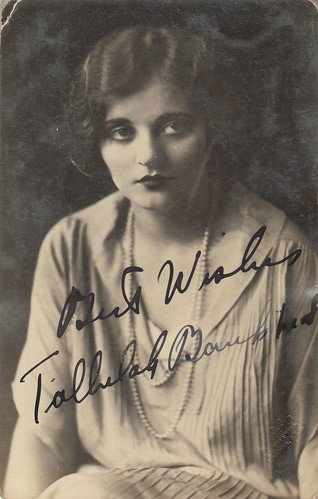
British autographed card from the 1920s.

British postcard by Picturegoer, no. 297. Photo: Dorothy Wilding.
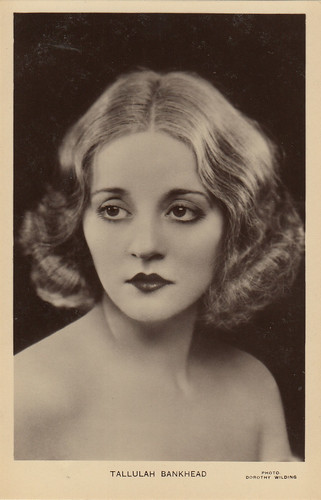
British postcard by Picturegoer, no. 297d. Photo: Dorothy Wilding.
The darling of the British stage
In the fall of 1922, she was noticed by famous British impresario and theatrical manager Charles B. Cochran, who campaigned for her upon his return to London and soon cabled her that she was seriously considered for the part of an American girl in Gerald Du Maurier’s forthcoming play 'The Dancers'. After having received another telegram informing her that another actress had been chosen, a determined Tallulah decided to go to Great Britain anyway. She arrived in January 1923 and quickly succeeded to convince Du Maurier that she was the ideal choice for his play.
'The Dancers' opened in February and was a huge hit. She played it more than three hundred times and it made her the darling of the British stage. Her other London plays include 'The Creaking Chair' (1924), 'Fallen Angels' (1925), 'The Green Hat' (1925), 'They Knew What They Wanted' (1926), 'The Gold Diggers' (1926-1927), 'The Garden of Eden' (1927), 'Her Cardboard Lover' (1928), 'Let Us Be Gay' (1930), …
She was noted for being the object of adulation from groups of young female fans, called the Gallery Girls, who greeted her loudly when she played on stage. For them, she represented the embodiment of their dreams and was the epitome of glamour and modernity. She also became famous for her wit, her hectic way of life, her antics and her constant partying.
In 1928, after her name has been linked to that of five Eton College students, she was the subject of a confidential report from the MI5 Security Service, which regarded her as an "extremely immoral woman" and even considered at a time to deport her from the country.
In 1928, she starred in the film His House in Order, for which she allegedly received the highest salary ever paid to a film star in England at the time. In 1929, she was seen and heard, thanks to the British Photophone process, in the short Her Cardboard Lover, a filmed extract from the play of the same name.
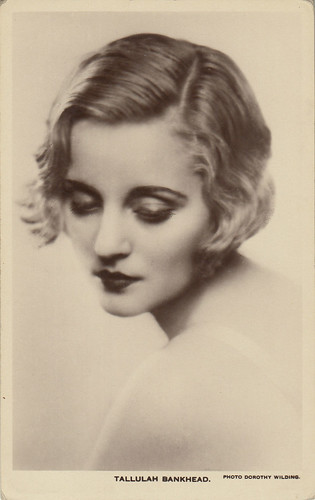
British postcard by Picturegoer, no. 297c. Photo: Dorothy Wilding.
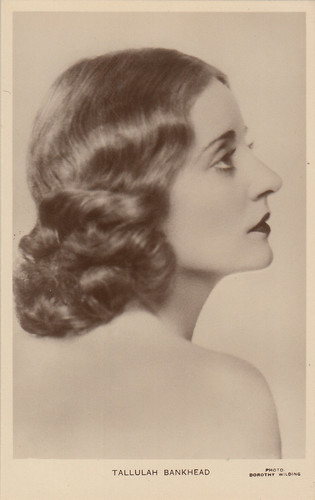
British postcard by Picturegoer, no. 297e. Photo: Dorothy Wilding.
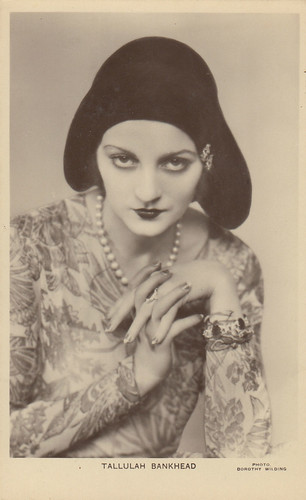
British postcard by Picturegoer, no. 538. Photo: Dorothy Wilding.
Back in the U.S.A.: difficult years
At the end of 1930, she signed a movie contract with Paramount, which wanted to turn her into another Marlene Dietrich. So, she came back to the United States. She was launched, in a blaze of publicity, in Tarnished Lady (1931), to disappointing box-office receipts and mostly negative reviews. My Sin (1931), The Cheat (1931), Thunder Below (1932), The Devil and the Deep (1932) and Faithless (1932), which she made on loan to M.G.M., followed.
However, on the whole, and despite an intensive promoting campaign ("We gave you Marlene Dietrich, now we give you Tallulah Bankhead" proclaimed the ads), she failed to elicit more than a tepid response from the public, which was not as enthusiastic as Paramount had hoped for. She was mostly used in heavy melodramas that didn’t do justice to her talents and were not really suited to her. Trying to make her a new Dietrich or a new Garbo had been a mistake. Tallulah had too much personality to be a second anybody.
Furthermore, in the summer of 1932, she gave an interview to the Motion Picture magazine in which she openly lamented over her lack of male companionship during the last six months and boldly declared: "I Want a Man". It caused a commotion at the time and Will Hays, the initiator of the famous decency code, soon expressed his disapproval. She issued a denial but it was too late: the damage had been done.
It was time for Tallulah to leave Hollywood and go back on the stage. She then starred in seven Broadway plays from 1933 to 1938, without scoring significant success. She reached the nadir when Shakespeare’s 'Antony and Cleopatra' closed after only five performances in November 1937. Ironically, one of her Broadway flops, 'Dark Victory', became a very successful screen vehicle for Bette Davis in 1939.
In December 1936, she screen-tested for the role of Scarlett O’Hara in Gone with the Wind but David O’ Selznick found her too old, as the heroine is not yet twenty years old at the beginning of the story.
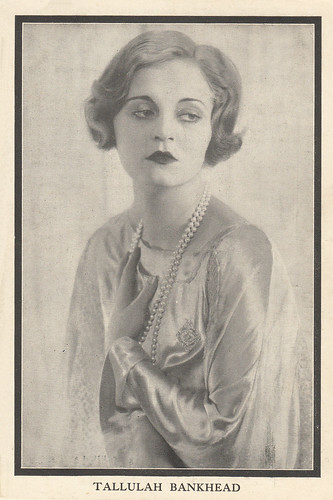
British promotional postcard for 'The Garden of Eden' at the Lyric Theatre (1927).
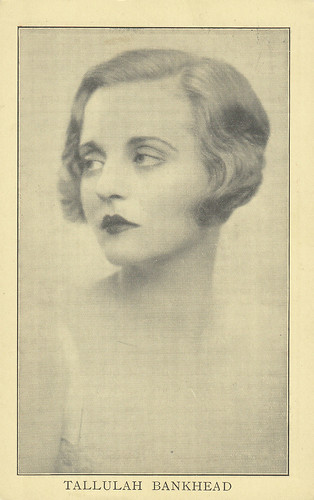
British promotional postcard for 'Let Us Be Gay' at the Lyric Theatre (1930).
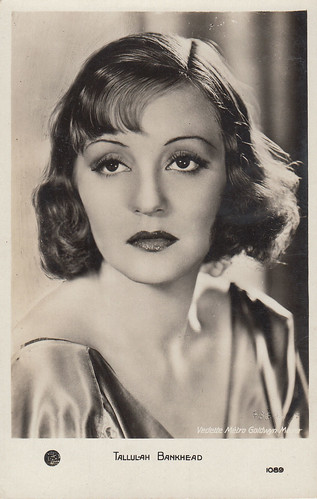
French postcard by Europe, no. 1089. Photo: Metro-Goldwyn-Mayer.
Back to the top
Fortunately, at the end of the 1930s, she was given the plum role of Regina Giddens in Lillian Hellman’s Broadway play 'The Little Foxes'. It was a triumph, which made her a luminary of the American Theatre, and she played it more than four hundred times, from February 1939 to February 1940. The 1940s were a brilliant decade for Tallulah on Broadway, especially thanks to Thornton Wilder’s 'The Skin of Our Teeth' (1942-1943) and Noël Coward’s 'Private Lives' (1948-1949).
In 1944, she starred in Alfred Hitchcock’s Lifeboat, in a role much better suited to her persona than her previous film parts. She then played Empress Catherine of Russia in Otto Preminger’s A Royal Scandal (1945).
She had her last Broadway success with 'Dear Charles' (1954-1955). Four resounding flops followed: 'A Streetcar Named Desire' in 1956, 'Eugenia' in 1957, 'Midgie Purvis' in 1961 and 'The Milk Train Doesn’t Stop Here Anymore' in 1964.
As the years went by, Tallulah the legend began to put Tallulah the actress in the shade. Several audience members came to see her on stage only to be entertained by their idol and have fun, even if she was appearing in a drama. For example, on the opening night of 'A Streetcar Named Desire', her gay following, much to her dismay, decided to take the play as a comedy and broke into gales of laughter whenever she had a line that could be construed as camp.
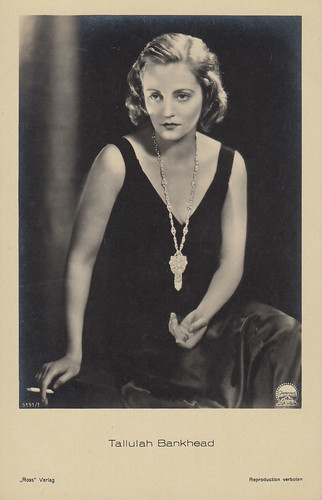
German postcard by Ross Verlag, no. 6191/1, 1931-1932. Photo: Paramount.

German postcard by Ross Verlag, no. 5998/1, 1930-1931. Photo: Paramount.

Spanish postcard by M.C. Barcelona, no. 285.
New challenges
In the 1950s, she tackled new challenges. From 1950 to 1952, she served as mistress of ceremonies on the radio in the big-budgeted and star-studded weekly program 'The Big Show'. People such as Groucho Marx, Ethel Barrymore, Marlene Dietrich, Louis Armstrong, Edith Piaf, Gloria Swanson, Gary Cooper, Danny Kaye, Ethel Merman, Bob Hope, Judy Garland, Ginger Rogers, Jimmy Durante, Frank Sinatra or Judy Holliday were among the prestigious guests.
In 1952, she made her first TV appearance and, in 1957, she played herself, to hilarious results, in an episode called The Celebrity Next Door of the popular Lucille Ball-Desi Arnaz Show. Her autobiography, simply called 'Tallulah', became one of 1952’s best-selling books. In 1953 and 1954, she headlined a lucrative cabaret act at the Sands Hotel in Las Vegas.
In 1951, she filed a complaint against her maid, who had been stealing money from her by forging checks. During the trial in December, the Defense tried to take the spotlight off their client and focused on Tallulah by making shocking revelations about her private life and her use of alcohol and drugs. The press had a field day, to her humiliation. The maid was finally declared guilty.
At the end of 1949, she screen-tested for the role of Amanda in The Glass Menagerie. Director Irving Rapper was amazed and deeply moved by her performance but Jack Warner, who thought that her drinking could cause problems during filming, chose Gertrude Lawrence instead. She appeared as herself in Main Street to Broadway (1953), seemingly having great fun at caricaturing her personality and uttering self-ironic lines such as "I doubt if anyone will have as many flops as I’ve had".
She later starred in England in the Hammer horror thriller film Fanatic/Die Die My Darling (1965), playing a former actress who has turned into an old ghastly-looking religious fanatic. It was intended to cash in on the vogue initiated by Whatever Happened to Baby Jane? three years before.
Tallulah Bankhead was a lifelong Democrat Party supporter. She was also a passionate anti-communist, but this didn’t prevent her from profoundly disliking Joseph McCarthy, whom she called a 'disgrace to the nation'. She expressed several times her support for the civil rights movement and opposed segregation. For example, in 1946, she publicly denounced the Washington National Theater, which, at the time, didn’t allow Afro-Americans to attend performances, and, in 1947, she spoke against lynching at a Chicago rally.
Her last role as an actress was as the evil Black Widow in two 1967 Batman episodes. She made her last appearance on television on The Tonight Show on the 14th of May 1968, alongside John Lennon and Paul McCartney, no less. She passed away on the 12th of December 1968, of pneumonia complicated by emphysema. Allegedly, her last audible words have been "codeine" and "bourbon". She thus would have stayed incorrigible until the end … and that’s the way we like her.
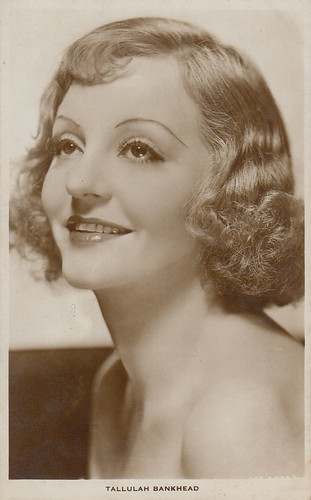
British postcard in the Film Weekly Series, London.
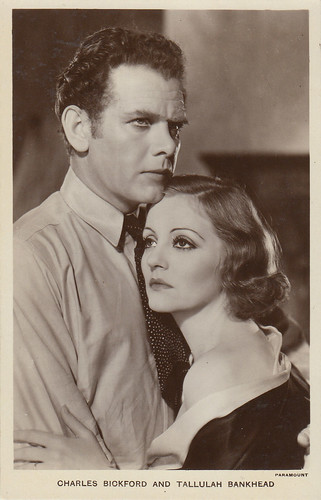
British postcard in the Film Partners Series, London, no. P55. Photo: Paramount. Tallulah Bankhead and Charles Bickford in Thunder Below (Richard Wallace, 1932).
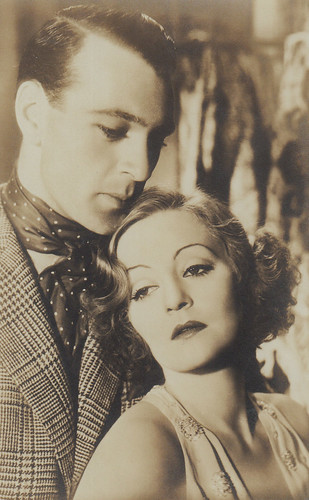
Vintage postcard. Tallulah Bankhead and Gary Cooper in Devil and the Deep (Marion Gering, 1932).
Quotes
To end this homage, here are several quotes credited to Tallulah. And also some quotes about her.
- "If I had to live my life again, I’d make the same mistakes, only sooner".
- "Nobody can exactly be me. Sometimes even I have trouble doing it".
- "Never practice two vices at once".
-"My father warned me about men and booze but he never said anything about women and cocaine".
- "Cocaine isn’t habit-forming. I should know, I’ve been using it for years".
- "Only good girls keep diaries. Bad girls don’t have time".
- "It’s one of the strange ironies of the theatre world that only one man in it can count on steady work: the night watchman".
- "I’d rather be right than righteous. Righteousness is unspeakable. It’s the weapon of weak people".
- "There have been two geniuses in the world, Willie Mays and Willie Shakespeare. But I think you’d better put Shakespeare first." (Note: Willie Mays was a famous Afro-American baseball player).
- "Bette Davis and I are good friends. That’s nothing I wouldn’t say to her face. Both of them".
- "They used to shoot Shirley Temple through gauze. They should shoot me through linoleum".
- About her difficulty to remember people’s names: "Once I introduced a friend of mine as Martini. Her name was actually Olive.
- To a critic who wrote a negative review about her: "I am sitting in the smallest room of the house. Your review is before me. Soon it will be behind me".
- After a screening of Fanatic: "I want to apologize to all for my appearance on the screen, looking older than God’s wet nurse".
- After having been told that her part in Batman would be camp: "Don’t talk to me about camp, I’ve invented it".
- Anita Loos: "Tallulah never bored anyone, and I consider that humanitarism of a very high order indeed".
- Katharine Hepburn: "Tallulah never disappointed anyone. She always lived up to people’s expectations of her - even at the very end when she was ravaged".
- Tony Randall: "She was unstoppable. She would do anything that came into her head. She was a little girl show-off, a little girl being bad all the time to get attention, being naughty and being darling".
- Stefanie Powers, her co-star in Fanatic: "Nothing in her life-style was mundane. It was always absurd, extreme, bigger than life. She never liked to go to the toilet alone. She liked to have an audience. I just adored her".
- Laurence Olivier: "She was great fun to be with and had more glamour than almost everybody alive".
- Burgess Meredith: "She was way ahead of her time".
- Joan Crawford: "We all adored her. We were fascinated by her, but we were scared to death of her, too".
- Howard Dietz: "A day away from Tallulah is like a month in the country".
- Critic John Mason Brown reviewing the play 'Antony and Cleopatra' in 1936: "Tallulah Bankhead barged down the Nile last night as Cleopatra – and sank".
- Alfred Hitchcock, after having been informed that Tallulah didn’t wear underpants during the filming of Lifeboat: "I don’t know if this is a matter for the costume department or hairdressing".

British postcard by Film Weekly Series, London.

American promotional postcard for 'The Little Foxes' at the National Theatre in 1939.
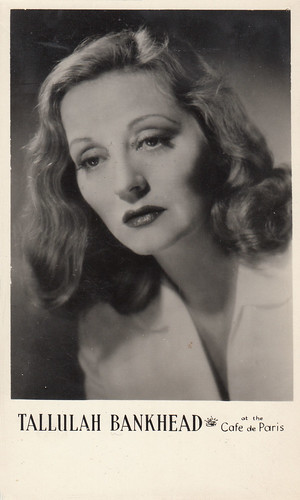
British promotional postcard for Tallulah Bankhead’s 1957 nightclub act at the Café de Paris in London. Collection: Marlene Pilaete.
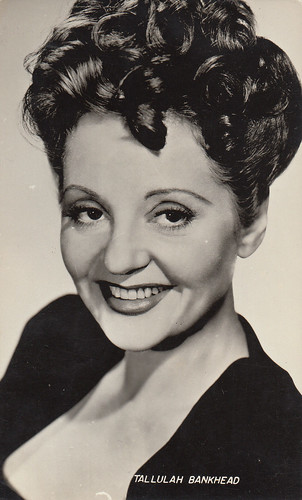
Vintage postcard.
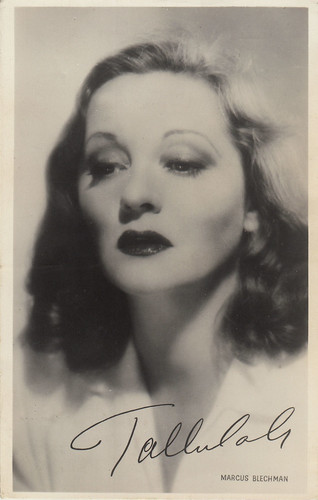
British promotional postcard for the publication of 'Tallulah’s story of her life' in the Sunday Express. Photo: Marcus Blechman.
Text and postcards: Marlene Pilaete.
No comments:
Post a Comment